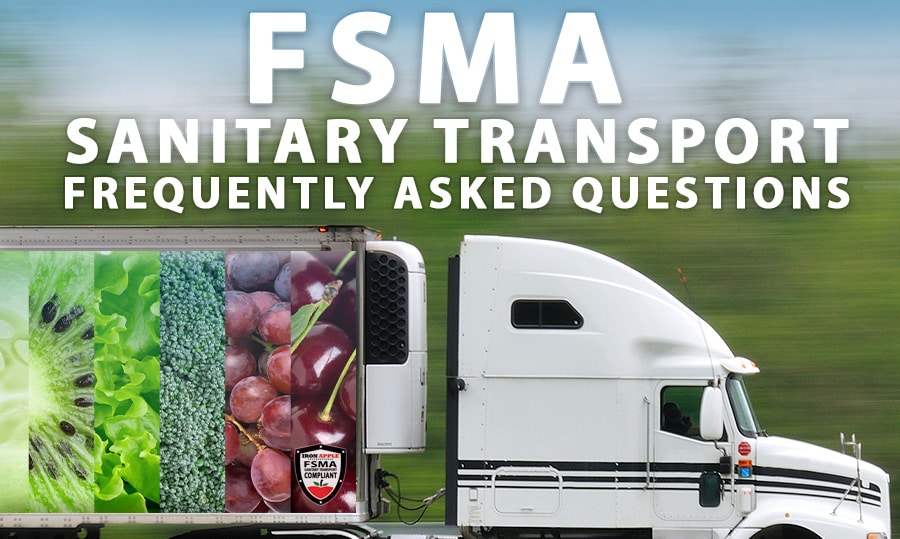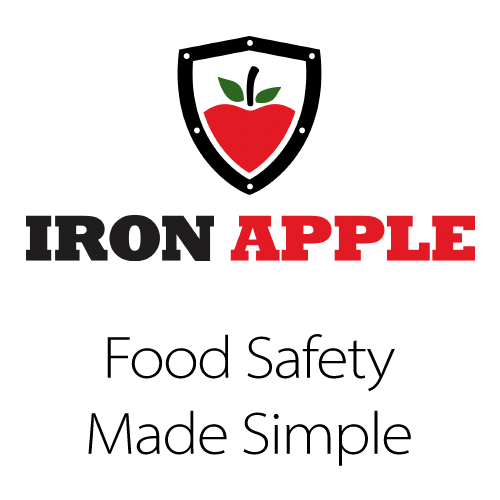
Commonly Asked Questions on FSMA & Sanitary Transportation Rule – Responses Provided by Iron Apple
Below is a collection of the most common FSMA and Sanitary Transportation questions we are hearing from the industry. Our food safety expert, Lindsay Glass, will be providing detailed responses and will also be available to field your questions. Check back frequently as we will update this on a regular basis. If you have a question that you would like answered, please send it along to media@ironapple.net and we will do our very best to provide an answer for you.
(Q & A are in order of newest to oldest)
Q. Assuming there is no contractual agreement with shippers/customers, what then is the minimum requirement regarding temp logs and how soon that info needs to be provided upon request?
A. Firstly, there should always be a written contract with the shipper as the shipper has the full responsibility of the product. Because the Shipper is the initiator of the transportation operation, we expect them to be knowledgeable about all factors concerning the food, e.g., its packaging and holding temperature requirements, relevant to its sanitary transport. Industry best practice is to monitor the temperature every 4 hours. The shipper and carrier can agree to a temperature monitoring mechanism for foods that require temperature control for safety. Carriers need to demonstrate they maintained requested temperature conditions only upon request, by the shipper or receiver. If the FDA requests temperature logs as a part of an inspection, records must be shown within 24 hours. We highly recommend that all carriers and shippers should have in place the proper documentation that clearly states temperature and other requirements for each party. If these are not yet in place, we recommend that you reach out to a company that helps with FSMA compliance to get your documents, training, and record keeping in order.
Q. Is frozen food subject to Sanitary Transport rule? Please provide the FDA reference to this for further research.
A. The FDA stated that the “temperature and time required for a frozen food to become unsafe, if not maintained in the frozen state would result in significant quality issues for the food” and rare that it would become unsafe for human consumption. However, the transportation of frozen food under conditions of inadequate temperature control or temperature abuse whereby the food could undergo microbial spoilage would not comply with proposed § 1.908(a)(3)(iii), the food load could be deemed to be adulterated under section 402(i) of the FD&C Act in that the food has been transported under conditions that are not in compliance with the sanitary food transportation regulations, for the carrier failed to provide adequate temperature control during transportation.
Q. We are a vending company that only ships RTE product between our own facilities. For example, production facility to warehouse to vending machines. Would we be affected by the Food Safety Modernization Act and Sanitary Transport rule?
A. The FDA stated that the “temperature and time required for a frozen food to become unsafe, if not maintained in the frozen state would result in significant quality issues for the food” and rare that it would become unsafe for human consumption. However, the transportation of frozen food under conditions of inadequate temperature control or temperature abuse whereby the food could undergo microbial spoilage would not comply with proposed § 1.908(a)(3)(iii), the food load could be deemed to be adulterated under section 402(i) of the FD&C Act in that the food has been transported under conditions that are not in compliance with the sanitary food transportation regulations, for the carrier failed to provide adequate temperature control during transportation.
Q. Regarding the non-covered business exemption for under 500k in revenue, what if a trucking company has over 500k in total revenue but a small % of their total receipts are regulated food products, much less than the 500k. Are we exempt from FSMA & the Sanitary Transportation of Human and Animal Food rule?
A. According to § 1.904, the FDA defines anon-covered business “as a shipper, receiver, or carrier engaged in transportation operations that has less than $500,000 in total annual sales”. The rule does not mention the percent of annual sales that are food. However, it is also important to note non-covered business are and will continue to be covered under the adulteration provisions and other applicable provisions of the FD&C Act and applicable implementing regulations, regardless of whether that business is included within the scope of this proposed rule. From what we’ve seen so far from the industry, many shippers are now requiring carriers that haul food for them to meet FSMA requirments, especially training and proper documentation. This really makes sense from a shipper and carrier perspective as it will help all parties involved reduce risk and increase preventive practices, ideally meeting the goal of FSMA. With enforcement of the FSMA rules now in effect, many carriers and shippers are not risking fines or personal liability and are moving forward with training and documentation solutions, even if they are exempt to be sure they are covered.







